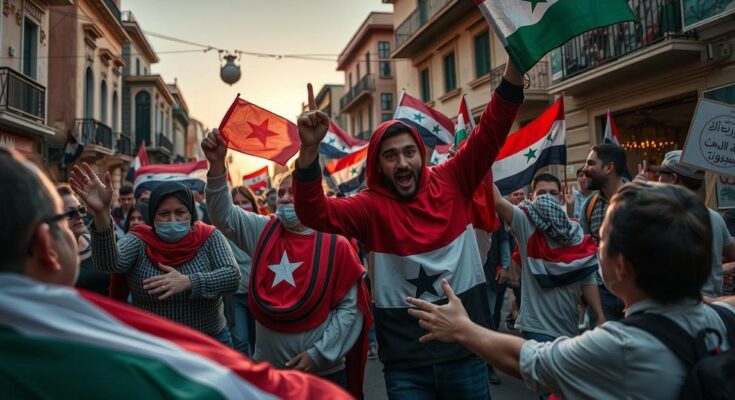Abu Mohammed al-Jolani, leader of Hayat Tahrir al-Sham, urged Syrians to celebrate the victory of the revolution following the ousting of President Bashar al-Assad. This call for celebration coincided with significant political changes, including the appointment of an interim prime minister. Thousands gathered in Damascus to express their joy as they engaged in the first Friday prayers since the regime change.
Abu Mohammed al-Jolani, the leader of Hayat Tahrir al-Sham (HTS), has called upon the Syrian populace to take to the streets in celebration of what he terms the “victory of the revolution.” In a video message shared via Telegram, al-Jolani, who revealed his identity as Ahmed al-Sharaa, expressed his congratulations to the Syrian people and urged them to express their joy publicly. This appeal comes in the wake of significant political changes following the recent ousting of President Bashar al-Assad, with the first Friday prayers since the regime change set to take place at the historic Umayyad Mosque in Damascus. Thousands of Syrians already began celebrating, gathering in key locations with flags emblematic of the pre-Assad era.
The recent developments in Syria unfolded rapidly, marked by a successful offensive initiated by HTS which led to their control of Damascus in less than two weeks. The leadership has swiftly appointed an interim prime minister expected to govern until March 2025. This shift in power represents a significant moment in the Syrian conflict that has persisted since 2011. Activists note that gatherings after Friday prayers were a pivotal part of early protests, symbolizing public dissent against the Assad regime.
The Syrian uprising, which began in 2011, evolved from peaceful protests demanding political reforms into a complex and protracted civil war involving various factions, international interests, and humanitarian crises. The recent events reflect a dramatic turning point, with HTS successfully displacing the long-standing regime of President Bashar al-Assad. The transition of power is significant not only for Syrian governance but also for the regional dynamics related to Islamist movements and the future of the opposition.
In conclusion, the call for celebration by Abu Mohammed al-Jolani marks a pivotal moment in the Syrian conflict. This significant shift in power dynamics presents an opportunity for a renewed chapter in Syrian governance as the populace engages with the changes brought forth by the revolution. The implications of these events may resonate throughout the region, influencing future political and social structures.
Original Source: www.seychellesnewsagency.com




